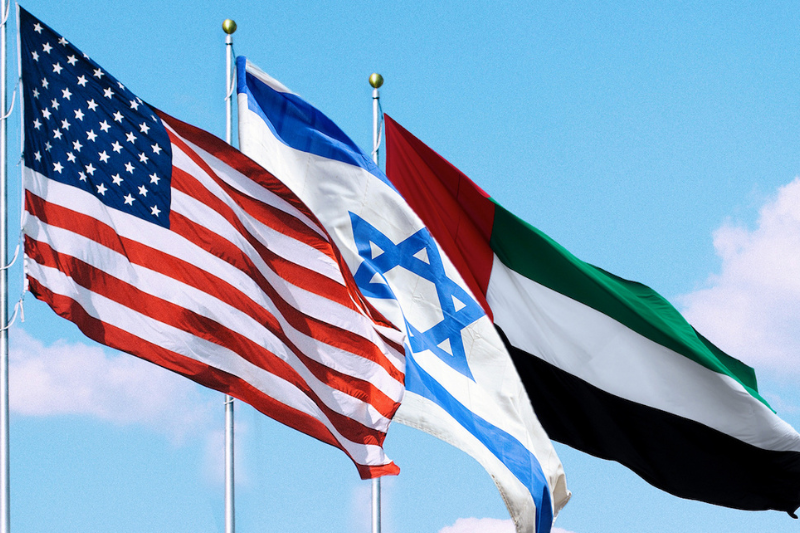
Abraham Accords: 3 Years of Transformed Middle East Region
In the annals of Middle Eastern diplomacy, September 15, 2020, stands as a pivotal date—the day when the United Arab Emirates (UAE) and Israel etched their names in history by signing the Abrahamic Agreement. As we commemorate the third anniversary of this transformative accord, it is imperative to conduct a comprehensive examination of the manifold ways in which this alliance has evolved.
Following in their footsteps, Morocco and Sudan subsequently embarked on a similar path. Ambassadors, mayors, ministers, and business leaders have collectively heralded the past year as the “most significant yet” in the evolving ties between these Arab nations.
‘A Tremendous Impact’ across the Middle East Region:
Eitan Na’eh, Israel’s Ambassador to Bahrain, has articulated the profound influence the peace treaty has already had on the Middle East. This impact manifests itself through a plethora of new deals that span sectors such as aviation, energy, technology, and healthcare. Moreover, it translates into millions of dollars in non-oil trade between Israel and the Arab countries involved in the accords.
Na’eh emphasized, “We see the impact of the Abraham Accords every day – whether it is in business collaborations, investments, soaring tourism numbers, increased trade, the exchange of ideas, and strong people-to-people ties.” Furthermore, he highlighted the experiences of Bahrainis who visited Israel, noting how they returned with newfound perspectives that underscored the commonalities shared between the two nations, fostering hope for their collective future.
Looking ahead, Ambassador Na’eh emphasized the burgeoning interest among the youth in the region who recognize the benefits of an integrated Middle East. He elaborated, “They see booming economies, which is a stark comparison to Iran and Lebanon, whose people are suffering as a result of their leadership’s decisions about joining an integrated region that would provide economic opportunities for all people of the Middle East.”
Keep Reading
A look at the evolving relationship between Israel and the UAE:
The CEO and Executive Chairman of Dubai Multi Commodities Center (DMCC), the largest free-trade zone in the United Arab Emirates, Ahmed Bin Sulayem, emphasized the Abraham Accords’ transformative effect on commercial contacts. He emphasized that due to the significant rise in Israeli businesses establishing their presence in the emirate, Dubai has quickly become a center for Israelis to conduct business on a worldwide scale.
This burgeoning interaction extends across various domains, from financial services to technology and telecoms, as noted by Bin Sulayem: “Nearly a third of Israeli companies registered in DMCC are in the precious metals and stones sector – specifically diamonds and gold – where Israel and the UAE are global leaders.”
This expansion in both volume and variety bodes well for shared economic growth, offering Israeli companies newfound access to markets they had not previously reached. Bin Sulayem emphasized, “With Israel being world-renowned for its innovation and pioneering start-up culture, I believe Dubai offers a platform for Israeli businesses to thrive.”
Progress Beyond Expectations in Middle East:
Deputy Mayor of Jerusalem, Fleur Hassan-Nahoum, highlighted the significant strides made in the past year, stating that it has been the most impactful period since the historic signing and immediate initiation of business and tourism. She noted the shift from celebrating “firsts” in the initial two years of the agreement to solidifying relationships and fostering a more integrated region.
An illustrative example of this evolution is the FemForward MENA cohort, which brought together women from the tech sectors of Morocco and Israel. This program has witnessed remarkable success and is expanding to include participants from Bahrain and the UAE, exemplifying the ongoing collaboration and mentorship among women in the region.
Way Towards a More Integrated Region:
Former Ambassador of the Kingdom of Bahrain to the US, Houda Nonoo, emphasized that while the first two years of the accords laid the groundwork for diplomacy, business, tourism, and people-to-people contacts, the subsequent year has seen the deepening of these relationships to create a more integrated Middle East. The increase in direct flights, business events, and academic exchanges highlights the tangible progress made in this regard.
Nonoo concluded with optimism, expressing the hope that the momentum witnessed in the past year will continue to drive the positive impact of the Abraham Accords, making the region more prosperous and interconnected, especially for its youth.
The Abraham Accords, initially established in August 2020 between the UAE and Israel, followed by Bahrain, set a precedent for peace and cooperation in the Middle East. Sudan and Morocco subsequently signed the peace agreement, and the White House has pledged to expand the accords, signaling the potential for further diplomatic breakthroughs in the region.
A ‘New Era’ for The Middle East:
Avi Hasson, CEO of Start-Up Nation Central, believes that the Abraham Accords have ushered in a new era for the Middle East. While the direct impact is evident in the signatory countries, there has also been increased collaboration in technology and innovation with other MENA countries that have not yet joined the accords.
Hasson emphasized the significance of platforms like Connect2Innovate, which have brought together business leaders from Bahrain and Israel to explore potential collaborations. These initiatives promote knowledge exchange and create business opportunities across the region.
Sharon Biton, MENA Region Vice-President for Israel Aerospace Industries, highlighted the growing collaboration in the defense industry between the UAE and Israel. Joint demonstrations and projects in Abu Dhabi have showcased the potential for harnessing cutting-edge technologies to address regional challenges.
Biton emphasized the UAE’s role as a bridge to the entire Arab world, contributing to regional security and stability.
As the Abraham Accords enter their fourth year, the momentum and positive impact they have generated continue to shape the Middle East, fostering a spirit of cooperation, innovation, and integration that transcends borders and holds promise for a more prosperous future.




